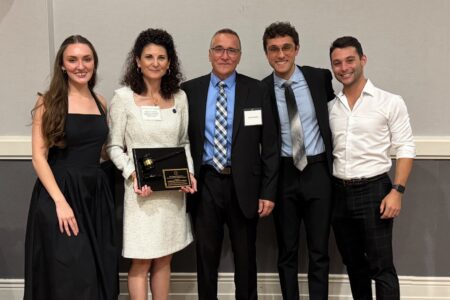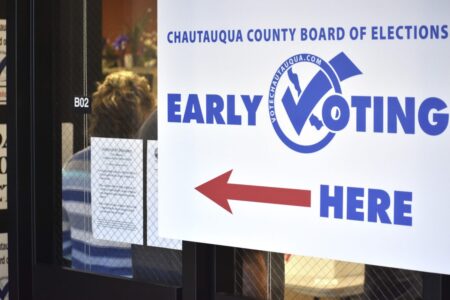Growing Wine Trail Uncorks Boost For Tourism
Editor's Corner
- Frederick Johnson Jr. speaks to a group at Johnson Estate Winery as vineyards dominate the background.
- Frederick Johnson Jr., owner of Johnson Estate Winery in Westfield, points out Freelings Creek during a tour of the vineyards. P-J Photo

Frederick Johnson Jr. speaks to a group at Johnson Estate Winery as vineyards dominate the background.
WESTFIELD — A light mist greeted about 65 attendees representing area media on a recent Saturday morning at Johnson Estate Winery. Owners Frederick Johnson Jr. and his wife, Jennifer, allowed guests to tour the historic grounds while asking about the different wines and production.
As the state’s oldest estate winery, it uses grapes grown from its own adjacent vineyards. According to its web site, the entire vinification process, including the crushing, pressing, fermentation, aging, and bottling, occurs on site with all of the European and American grapes used to make estate wines grown within 3,000 feet of the winery.
In existence since 1961, Johnson Estate has seen the highs and lows of the area’s grape industry, which remains one of the best in the world. It has survived spring frosts and an evolving Western New York economy.
Its story began in 1908, when Fred Johnson’s grandfather, Frederick Johnson, purchased a home and farm along the banks of Freelings Creek. When he died in 1960, his son, Frederick Spencer Johnson, returned to the farm after serving in World War II and working overseas for Nelson Rockefeller. His ambitions included the planting French-hybrid wine grapes in a region dominated by Concord and Labruscan juice grapes led to the beginnings of Johnson Estate.
That trailblazing work is what has led to the booming growth of the wine industry since 2000 along the Lake Erie shores. In a quarter-century, the expansion has been nothing short of impressive. Consider these additions in Chautauqua County alone: Willow Creek Winery near Silver Creek, 1999; Sparkling Ponds in Ripley, 2005; Noble Winery in Westfield, 2006; Mazza Chautauqua’s location on Route 20 in Westfield, 2006; Liberty Winery in Sheridan, 2008; and 21 Brix in Portland, 2011.

Frederick Johnson Jr., owner of Johnson Estate Winery in Westfield, points out Freelings Creek during a tour of the vineyards. P-J Photo
Add in the development projects that have occurred at some of these newer locations, especially at 21 Brix and Liberty Vineyards, and there is reason to believe these sites are boosting regional tourism efforts. In all, according to Lake Erie Wine Country, there are 21 wineries that span the 50 miles that include the two states of New York and Pennsylvania.
Johnson Estate and Merritt Estate Winery near Forestville, which was founded in 1976, are the veterans of the bunch. In addition, there are another 13 wineries in North East and outside of Erie, Pa.
Eric LeBlanc, executive director Lake Erie Wine Country, was one of the tour participants on the damp Saturday morning. His efforts — as well as those of the organization — were hailed by Fred Johnson.
“It is the vehicle we use collectively, working together as … local wineries, to bring people from Cleveland, Pittsburgh, Buffalo and farther away,” he said. “Once we get them here, then we can really compete amongst each other and get them to come to our (locations). But it’s much more efficient to work together to get them here.”
As noted by the Lake Erie Wine Country, the locations bottle products for all tastes, from fruity native Labruscas and exquisite French-American wines to European-style wines. The styles are unique and diverse, resulting in widespread consumer enthusiasm. Many of the wines, particularly the whites, compete with and often beat those of competitors’ on an international stage.
Despite the accomplishments and growth, Lake Erie’s wineries have not caught up to the fast-paced and burgeoning east. There, Finger Lakes Wine Country acts as a unified voice for the 3,065 square mile area that includes five counties — Chemung, Schuyler, Steuben, Tioga, and Yates — and three wine trails of Cayuga, Seneca, and Keuka.
Overall, the organization represents 44 wineries in those major trails that benefit in part from traffic that comes from New York City clientele. Because the destinations became so popular, trouble followed in the form of erratic behavior. Those issues, in 2007 and 2010, were quickly squelched once the locations became more vigilant with over-imbibing customers who were unruly and at times putting themselves and others at risk.
There was none of that at Johnson Estate on that May morning. Following the tour of the vineyard and facilities, there were breakfast charcuterie boards and samples of its signature wines that included Chardonnays, Marechal Foch and Founder’s Red.
As the event came to a close, the earlier mist had turned into a steady rain. That precipitation failed to sour the mood at the Westfield winery — or the continued progress of a trail that is building a reputation as a destination with travelers across the nation.
Tourism is a significant economic sector in this county. A healthy wine industry is a key piece to driving traffic here. We can all raise a glass to that.
John D’Agostino is editor of The Post-Journal, OBSERVER and Times Observer. Send comments to jdagostino@observertoday.com or call 716-487-1111, ext. 253.





